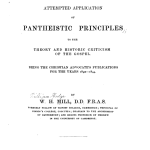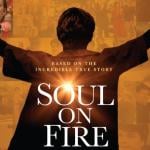 Every Monday I drive six hours total from Ashland (OH) to Detroit (MI) to teach Greek at our extension campus. My travelling companion for many weeks has been Prof. John Goldingay. Well, he is not in the car….but he is on my ipod. I spent dozens of hours listening to his thoughts in hermeneutics and also the Pentateuch. I recent days I have been gleaning wisdom from his thoughts on the prophets. Unlike many fortunate others, I had not known of his work until very recently. After working through many of his lectures, I sought out getting is very excellent three-volume set on Old Testament Theology which is divided into Israel’s Gospel, Israel’s Faith, and Israel’s Life (InterVarsity Press). John’s way of writing and interacting with the text and theology is refreshing, challenging, accurate, and very different from your run-of-the-mill ‘systemization’ efforts that are often found among evangelicals. John’s style is more conversational, pastoral, exploratory, relational.
Every Monday I drive six hours total from Ashland (OH) to Detroit (MI) to teach Greek at our extension campus. My travelling companion for many weeks has been Prof. John Goldingay. Well, he is not in the car….but he is on my ipod. I spent dozens of hours listening to his thoughts in hermeneutics and also the Pentateuch. I recent days I have been gleaning wisdom from his thoughts on the prophets. Unlike many fortunate others, I had not known of his work until very recently. After working through many of his lectures, I sought out getting is very excellent three-volume set on Old Testament Theology which is divided into Israel’s Gospel, Israel’s Faith, and Israel’s Life (InterVarsity Press). John’s way of writing and interacting with the text and theology is refreshing, challenging, accurate, and very different from your run-of-the-mill ‘systemization’ efforts that are often found among evangelicals. John’s style is more conversational, pastoral, exploratory, relational.
 Anyway, he was kind enough to answer a few questions about his research and this important contribution to scholarship. Thanks, John!
Anyway, he was kind enough to answer a few questions about his research and this important contribution to scholarship. Thanks, John!
NKG: What inspired you to carry out this project? In what ways did you feel that what is currently out there in OT theology is lacking?
JG:I don’t think it occurred to me that anything was lacking. I guess I wanted to articulate for myself the significance of the Old Testament and invite other people to read it over my shoulder. And I had been imagining I would write an OT Theology one day because I had been thinking about the issues since I wrote my dissertation, Theological Diversity and the Authority of the Old Testament.
NKG: Had you always conceived of this as multiple volumes?
JG: Yes, though not as long as it turned out to be!
NKG: What led you to the three categories of gospel (story), faith, and life?
JG: I think I started off envisaging something like the volume on “faith,” perhaps followed by something like the volume on “life,” and I was really expecting to work out the implications of what I had written in my dissertation. But by the time I came to write the Theology I had written my Models books which emphasized narrative, and I realized that narrative had to come first. The word “gospel” was then designed to confront one key Christian misapprehension about the OT. The “life” category issued from trying to think out the OT’s implicit way of conceptualizing the issues it covers, which include what we call ethics, worship, and spirituality but does not use those categories.
NKG: You prefer to speak of the ‘First Testament’ instead of the traditional phrase ‘Old Testament’. Why?
JG: Because “Old Testament” makes it sound antiquated and out of date. “Hebrew Bible” makes it sound as if it stands alone.
NKG: When you wrote these three volumes, what other theologians did you find as your constant companions? What OT (or FT!) theologians have continually inspired you?
JG: I didn’t work like that. I worked by reading the Bible. Then afterwards I read other works to see what I had missed or what needed adding or making connections with.
NKG: Getting off subject for a bit, how do you feel about the new ‘Theological Interpretation of Scripture’ hermeneutical discussion that is going on (Moberly, Hays, Watson, Treier, Fowl, Green, etc…)? Do you generally agree with its concerns with historical criticism and appreciation for pre-critical interpretations? Have you found it stimulating for reading the First Testament?
JG: I see teasing out the theological implications of the text as integral to exegesis. I am passionately opposed to conforming the reading of scripture to the church’s creeds and traditions.
NKG: When it comes to your newest volume, Israel’s Life, you concentrate especially on a set of relationships: living with God, one another, and with ourselves. Is there also an interest in the FT in the outsider? (I am not saying that your work is lacking. I am working on the subject of Scripture’s view of the ‘world’ from an ethical perspective). What is the FT’s ethical stance towards the outsider? What was Israel’s responsibility?
JG: Israel is not very American. It doesn’t think we should mess too much in other nations’ lives. God told it that its task was to let God bless it in such a way as to draw the world to its God. Drawing the world is God’s business.
NKG: Do you mind sharing with us what other projects you have lined up? I saw that you will be working on the Old Testament For Everyone series. How exciting! Will you have time for other writing?
JG: I’m writing the International Critical Commentary on Isaiah 56-66, a Biblical Theology, and a memoir about my wife, who died last year, and I have compiled two collections of papers on OT Theology and on Interpretation that I have written over the years. But God may decide this is too much and decide it is time I went to Sheol for a time.











